Interview: Devin Townsend “I Find That I Answer A Lot Of My Own Questions”
Canadian guitarist Devin Townsend is bringing his “An Evening With Devin Townsend” show to Auckland’s Hollywood Cinema on Friday, September 6th.
The show with include an all acoustic set from Devin, plus a Q&A segment where fans can query the guitar-slinger in this very intimate of settings.
The 13th Floor’s Marty Duda got Devin on the blower and asked him “Why?” Why would he put himself through the torture of being asked the same inane questions, night after night.
The answer may surprise you…
Click here to listen to the interview with Devin Townsend:
Or, read a transcription of the interview here:
MD: This is a different kind of tour to what you’ve done before. I know you’ve already been doing some of these – An Evening With… and acoustic things, where you were doing Q&As with the audience members and whatever. I gotta ask – why would you put yourself through that? Having to— an interview is bad enough, you’ve got to talk to me, let alone all of those people in a room?
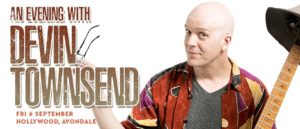 DT: Well, I mean I think it’s not as bad as maybe it would appear on the outside. I mean, this particular portion of my career in some way includes that. And it’s important for me to be able to make myself available to the audience in that capacity, and I think a lot of the reason for that has been that I needed to change how things were going for me, as I tend to do, once every decade, once every seven years, or what have you, and participating with the audience gives me more of a perspective on what it is that I actually represent, or what it is that I actually do, in terms of the public eye. I mean, it’s very easy to get lost in your own trip and have no idea what it is that you represent. I kinda value their, the audience’s, input, to be honest.
DT: Well, I mean I think it’s not as bad as maybe it would appear on the outside. I mean, this particular portion of my career in some way includes that. And it’s important for me to be able to make myself available to the audience in that capacity, and I think a lot of the reason for that has been that I needed to change how things were going for me, as I tend to do, once every decade, once every seven years, or what have you, and participating with the audience gives me more of a perspective on what it is that I actually represent, or what it is that I actually do, in terms of the public eye. I mean, it’s very easy to get lost in your own trip and have no idea what it is that you represent. I kinda value their, the audience’s, input, to be honest.
MD: That’s right. Well, I mean, I guess there’s two schools of thought along that line. There’s the artist who says they don’t care, I mean, they’re going to go their own way and do what they want to do, and if the audience is there for it, great, or, there’s the artist who listens to their audience and wants to try and…
DT: I’m somewhere between. Cause I think – my problem with artists who claim that they do it entirely for themselves, is in my mind, I’m like, well then, “Don’t put it out.” If it’s entirely for you, then, I can understand making it available flippantly, but if you’re advertising it and interviewing and promoting it, and touring when you’d maybe rather not be, then there’s clearly some sort of financial agenda. And, if there is, ultimately I think there’s a line you can draw between doing music for yourself primarily, but also understanding that your fanbase is also your… I guess, customers, if you want to look at it that way. And to not take into at least some vague consideration what it is that your work has represented to your audience, I think is – well, I don’t think selfish is the right word. I just think there’s a lot of times where you can claim artistic licence in a sort of altruistic way, but when you look at it deeper, man, I don’t think if you’re monetizing it, it’s really that at all. So, just, participate, man. Everybody’s on your team.
MD: Right, right. So, when you’re talking to your audience, and they’re talking back to you, what are you learning about what they expect from you?
DT: Well, I mean, I like to think I got a pretty healthy perspective on the audience and my involvement with them, and by that I mean that I’ve fortunately grown up in an age right after that era where rock stars and rock-stardom was an actual thing. Like, in the 80s, when you could kinda rationalize being… sunglasses inside at midnight, that kinda thing, you know, that whole… kind of perspective that – simply by being a musician, your worth as a human is fundamentally greater than that of your audience, and therefore the interaction ends up being that, if they’re lucky enough, you’ll dispense benevolence on them in terms of words or work or something. And for me, it’s just a bunch of other people. And I think as fucked up as I am, the audience is just as fucked up. And there are people who are participating in my work who are much more clever than I am, much less clever than I am. There’s doctors, or unemployed, or whatever. So what I get from it is just a perspective. And I think, for as long as I can remember, social interaction – although I’m not completely terrible at it, it has always been something that I struggle with. I don’t – it takes a lot of effort for me, to not… hang out like a hermit all the time. So by talking to the audience, it’s a way for me to participate with other people. In a sense. And I don’t know, I would question the value of not doing it, to be honest.
MD: I was gonna say, when it’s – having a conversation with someone where it’s set up like formal setup, like you and I have right now. If we were standing next to each other, we probably wouldn’t be talking to each other, at a bus stop or something, but when it’s arranged like this, it’s easier for people to then feel that it’s okay to talk to each other, and that must be similar set up with the audience in this show.
DT: Yeah, and I like to think that a lot of what I do is based on trying to actualize myself, I guess, as a person. Or at least, get better as a person. And… it offers an opportunity to have conversations with people who have different and unique perspectives on what you do. And to have people who are strangers, with an objective point of view, give you some input. And I’m not talking about overt praise, or overt criticism, things that you have to take with a grain of salt, but I mean, actual questions or actual queries or concerns. Or, what is the technique that you use here… “Why did you choose to do this as opposed to that?” Just by being put on the spot like that, I find that I answer a lot of my own questions.
MD: Do you have answers to those questions?
DT: Of course. Oh yeah, I learned so much from other people. Maybe there’s a certain aspect of that where I’m just – my peripheral vision, in terms of who I am and what I do, is pretty limited for whatever reason. So, having it reflected off of others is – helpful to me. In fact it’s – this will be one of the first times – and this is a truth – where I’ve got the impression from somebody that doing it will be a total pain in the ass? Maybe the more I think about it, the more I’ll decide – “Oh, shit, he’s right.” And then just don’t do it anymore.
MD: I would imagine that you get the same questions over and over again, and people are trying to be clever, and one-up themselves….
DT: I don’t know, man! I honestly feel that I’ve got a pretty cool audience, dude. Like, I don’t feel like there’s a lot of the hyper-projection, where people are attributing their emotional connection to the work as you being the embodiment of it. Thank God. Because that doesn’t help. But the impression I get is that there’s a lot of pretty clue-y people that appreciate the fact that I’m kind of relentlessly and pigheadedly doing my thing. So more often than not, the questions that I get, are cool. I don’t find that there’s a lot of, like, “What’s your favourite colour?” You know what I mean?
Like, “If it was just you and me on a boat, what would we do?” You know what I mean. I just don’t – I don’t think that I seem to incite that kind of audience. It seems just like, normal people, that have some overall, some fairly interesting questions.
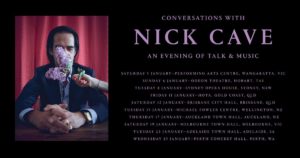 MD: I think I got that idea from Nick Cave is doing a similar thing, you know. He’s just taking questions from his audience, and that’s his thing at the moment. And he’s getting a lot of that kind of reaction from people.
MD: I think I got that idea from Nick Cave is doing a similar thing, you know. He’s just taking questions from his audience, and that’s his thing at the moment. And he’s getting a lot of that kind of reaction from people.
DT: Well, he’s – he’s iconic, though. I mean, he’s like – when I think of Nick Cave, there’s a dark, tall, brooding image that comes into my head immediately. Not like he’s a character of himself, far from it. He’s had a super-intense life and he’s brilliant, and all these things. But he seems much more like an icon than myself. I’ve changed so much, publicly. I go down one avenue and then bump up against something, and then change my mind, and then go down another avenue and then bump up against something, and change my mind, to the point where I get the impression, at least, that the persona that I have is pretty much just a creative guy that’s fumbling his way through life like everybody else. So maybe, in my younger years, I should’ve tried to create more of a brooding persona for myself. But the less I have to follow up on some sort of persona, the more free I can be just to be who I am, right? I couldn’t imagine having to uphold some sort of image. Like, I’m the brooding guy, therefore – I can’t wear my octopus socks today, or something. I don’t know.
MD: Although, let’s face it, I mean – if you read a lot of the reviews and things, the G-word, the “Genius” word, comes about quite a bit – is bandied about quite a bit – when it comes to you. And people are kinda calling you a modern-day Frank Zappa, that kind of thing.
DT: Well, I heard an interesting skit from Louis C.K., the other day, how he said that the word “Genius” is being thrown about – what did he say – he was talking about two guys at a party, and one guy says, “Dude, I brought a cup, in case we needed a cup.” And the other guy’s like, “Dude, you’re a genius.” There’s like… I think, words get thrown about, until they represent something other than what they maybe literally represent. I think I’ve got a, I think I’m the best in the world, at being me.
MD: Right. Okay!
DT: You know what I mean? There’s no one in the whole world that could be a better version of me than me. So, if you want to talk about that, then sure. I mean, I’m pretty – I’m a genius at being who I am. But so’s everybody, essentially. And I think that what I can clearly and confidently state is that what I’ve been trying to do with my career, what I’ve been trying to represent, is just – “Be yourself.” In all the awkwardness, in all the ups and downs. When you make a mistake, that’s part of it. You can’t succeed unless you’ve fucked up over and over and over again. And doing it publicly is a great test, because it makes it much more difficult to say, OK, I’m just going to get up and keep going, because you’re humiliated by your own actions or whatever. But I think that what I represent, and what my thirty-record trip so far represents, is just “I’m trying to figure out who I am,” and just doing it with the most pointed connection to what I consider to be authenticity, each time as I go, and I don’t necessarily think of that as genius, but I certainly think of that as being, like, “You gotta fight for it,” and maybe there’s something that I represent that will help other people recognize that they’re the only person that can be the best version of 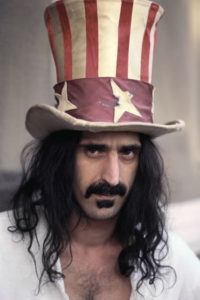 them, too. So I don’t know. And the modern-day Frank Zappa thing is like… no way, man. After working with [Mike] Keneally and Morgan [Agren] and you know, I was with [Steve] Vai, and all this Zappa – and I know his kids, and all that sort of thing…
them, too. So I don’t know. And the modern-day Frank Zappa thing is like… no way, man. After working with [Mike] Keneally and Morgan [Agren] and you know, I was with [Steve] Vai, and all this Zappa – and I know his kids, and all that sort of thing…
Zappa was a genius, in terms of musical[ity]. And I mean that in the most… tangible way. Yes, he was a genius. However, there were a lot of things about him that I just didn’t dig. I thought that maybe he was an ineffective father, since, just looking at the state of the family, and maybe there was something… that’s presumptuous of me, I don’t fucking know. I mean, I’m not the world’s best father either. But… I certainly don’t think I woulda named my kid, like, Shitheels and then like thrown him out in the world, and been like, “Yeah! Go!” But I also feel that with Zappa, there’s huge fundamental differences between what he does and what I do. I don’t know theory, I don’t know jazz, I don’t know any of these things. I just I love Captain Beefheart.
MD: There you go.
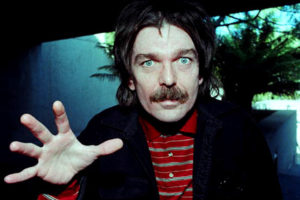 DT: Because I always got the impression that he was trying to write love songs. And he was just a fucking banana. I could see him just presenting a song to a woman, he was like, [imitating] “I wrote this song for you.” And she’s just, like, “Dude, this makes no sense to me.” And him being legitimately confused?
DT: Because I always got the impression that he was trying to write love songs. And he was just a fucking banana. I could see him just presenting a song to a woman, he was like, [imitating] “I wrote this song for you.” And she’s just, like, “Dude, this makes no sense to me.” And him being legitimately confused?
As opposed to Zappa, where I always got the impression where he was like – “I’m smarter than everybody, so I’m going to make a bunch of smart people wear stupid hats, and say stupid things.” But, that’s a weird conversation for me to have, because you know, Keneally and Morgan, who are now playing in this next iteration of what I’m doing live, love Frank Zappa, with every ounce of their soul. Like, I’ve never seen that type of devotion to an artist. And who am I to discredit that? I can only say that, while Zappa was happening, I really liked Judas Priest, or something. You know.
MD: So, we’ll wrap up. I’ll ask a question that I’m imagining that someone may ask at one of these, uh, things that you’re putting on. Give me a little…what you think is the future of guitar music – the guitar in general? Because there’s a school of thought that thinks that, oh, the guitar is out and nobody’s interested in them anymore. It’s all about playing on your computer or whatever.
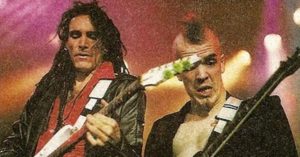 DT: I mean, I hesitate to say this, but I kind of agree. But I love guitar. And you know, I’m going to do something next month where – you know, the fifteen-year-old in me, would just be blown away if he heard I was gonna do this. But I’m teaching at this camp with like, Satriani, and Vai, and it’s crazy, man. But I think that I lost my taste for solo guitar music while I was with Steve [Vai], actually. Just because I don’t know, it was just like, everywhere. And I was like, “I don’t know if this is really what I’m looking for with it anymore.”
DT: I mean, I hesitate to say this, but I kind of agree. But I love guitar. And you know, I’m going to do something next month where – you know, the fifteen-year-old in me, would just be blown away if he heard I was gonna do this. But I’m teaching at this camp with like, Satriani, and Vai, and it’s crazy, man. But I think that I lost my taste for solo guitar music while I was with Steve [Vai], actually. Just because I don’t know, it was just like, everywhere. And I was like, “I don’t know if this is really what I’m looking for with it anymore.”
So I think maybe the future of it will have it become a voice, as opposed to a solo instrument. And by that I mean as a tool. If you look at a guitar as like a hammer, or a screwdriver, or what-have-you, it’s a compositional tool for me that, when I’m writing orchestral music, when I’m writing keyboard-oriented music, when I’m writing vocal lines etc, the guitar is the way that I translate my language into my DAW. And as a result of that, my capacity for shred, or whatever – it’s still there, to a certain degree. It’s much more like one of the tools that I have in order to articulate myself. And I think that what the guitar has over keyboard, over laptops, is it’s they’re just fucking super cool to look at, you know what I mean?
I’m looking at – right before I called you here, I took the strings off of one of them. And just put lemon oil on the neck, and I’m just setting up for a different tuning. It’s a signature thing, I’m working with Framus – it’s such it’s like a race-car. And there’s something about that, that I think is a tangible thing that people can say, “Hey, that’s a really cool piece of art.” As opposed to, you know, everybody likes to personalize things, right? So, as opposed to a keyboard, or as opposed to a laptop. It serves a similar purpose, yet it’s just bad-ass.
- Park Rd – Call Me Up: 13th Floor New Song Of The Day - May 5, 2024
- Emma Dilemma – Ready Or Not: 13th Floor New Song Of The Day - May 4, 2024
- New Music Friday: 13th Floor New Album Picks: May 3, 2024 - May 3, 2024
